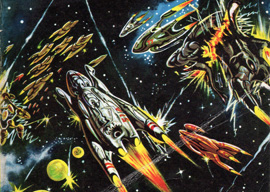
March 15, 2012

The trouble with having lived through that high summer was that the sun never again seemed as bright. Sometime in the early 1960s sci-fi lapsed into self-consciousness and (yecchh!) “social relevance,” losing its soul. Then, like everything else, it went from narrative to visual: sci-fi movies, TV shows, and up-market comic strips by artists such as Moebius. His drawings for the mid-1970s adult comic Heavy Metal came as close to visually capturing the Golden Age vision as can be done”far closer, certainly, than puerile dreck such as Star Wars or Back to the Future.
There’s the trouble: an adolescence spent with Asimov, van Vogt, and Heinlein makes you a crashing sci-fi snob. Don’t even get me started on Doctor Who or Star Trek. I grew up in the vineyards of Burgundy and Bordeaux: You can keep your supermarket plonk.
Looking back, how odd it all seems. “Imaginative fiction”? Wonder, terror, and excitement? Who has the time or mental space for such things now? We surf and browse, Twitter and Tweet, fondling thoughts for a moment or two, then discarding them for new ones. The imagination only grows in stillness and slow time, both of which our civilization has mislaid.
Furthermore, as that BBC story tells us, cold reality has scotched the dreams of the sci-fi Golden Age. There will be no adventures in space: Our earthly tissues aren’t up to the job. Time travel is not possible, and there are no telepaths.
Most likely our species” future leads to something like the Singularity. By its nature, we cannot comprehend what comes after the Singularity…though its prospect generated some striking late sci-fi.
Or as a character says in Authentic No. 82’s lead story (one of the very few pieces of fiction I have ever read that is written in the second person): “What triumphs ultimately is something too big for your comprehension or mine.”
* * * * * * * * * *
Since my “Life at Half Speed” column last week I’ve received many expressions of sympathy and concern from readers. There’s a good selection on the comment thread there, and I’ve had at least an equal number as personal emails, and now another batch on Steve Sailer’s blog.
I’m deepy moved by all the kindness there and offer my heartfelt thanks to all.
And no, to answer one emailer: Although an unbeliever, I don’t at all mind people telling me they’re praying for me. I think it would be churlish to mind. Everyone has his own way to express sincere hopes for another’s good, and that’s how religious people do it. Correction: It would be HORRIBLE to mind!
I am in any case grudgingly respectful of Pascal’s Wager. The guy was, after all, a fine mathematician.
I should say that there is no real cause for alarm. The prognosis for my particular condition (it’s this one) is excellent. A friend of mine’s husband is an oncologist. Apprised of my diagnosis, he said: “Oh, you got the easy one!” The chemo brain business aside, I feel fine.
My beloved mother was a professional hospital nurse, 1928-72. She had seen every kind of medical horror”including pre-penicillin and pre-streptomycin varieties, and injuries from aerial bombing”and was not shy about detailing them over the family dinner table. “There’s always someone worse off than yourself” is the stock-in-trade of mothers everywhere, but it came with exceptional force from mine.
“KBO. That’s the order of the day.”
Thanks once again to all. Thank you, thank you.